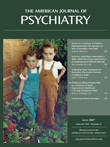Essentials of Geriatric Psychiatry
This textbook is a condensed version of Blazer, Steffen, and Busse’s comprehensive third edition of the Textbook of Geriatric Psychiatry . During the course of its 19 chapters, 38 contributing authors offer important commentary on the major psychiatric conditions that impact the elderly. These chapters provide a sound overview of the epidemiology, clinical features, and treatment of geriatric conditions. The textbook is also an excellent resource for individuals preparing for their added qualifications in geriatric psychiatry because it includes study questions and an answer guide.
The first two sections of the book outline the basic concepts, epidemiology, and assessment of geriatric psychiatric conditions. These chapters review the physiology of aging and its effect on the major organ systems. They also discuss diagnostic interviews, laboratory tests, and disease-specific neuropsychological assessments for a broad range of conditions, including dementia and depression. However, the book lacks a substantive discussion of the role of medications (e.g., anticholinergics, antiarrhythmic agents, and antihistamines) in the development of dementia and delirium, and considering that geriatric patients tend to juggle a myriad of nonpsychiatric medications, this seems like an important omission.
The next major section addresses specific diagnostic entities that range from dementia to substance use disorders and from somatoform to sleep disorders. This section also examines the relationship between aging and major psychiatric disorders such as schizophrenia and bipolar disorders.
The final section of the book includes chapters that describe treatment options for geriatric conditions; these chapters highlight the role of psychopharmacology and psychotherapy in the care of the elderly. The book then concludes with two practical chapters that underscore the importance of open communication between family members and mental health practitioners in nursing home settings.
Despite the strengths of this book, Essentials of Geriatric Psychiatry has one major shortcoming: it lacks a discussion of mild cognitive impairment. Because mild cognitive impairment is a relatively new diagnostic entity, inclusion of the most recent diagnostic criteria and its association with dementia would have been extremely useful.
Essentials of Geriatric Psychiatry seeks to fully inform primary care providers and other clinicians about common geriatric psychiatry disorders, and with the exception of a few minor flaws, it successfully pares a great breadth of material down to the more manageable particulars. Essentials of Geriatric Psychiatry is indeed an essential reference for geriatric psychiatry students, residents, fellows, and practitioners.



